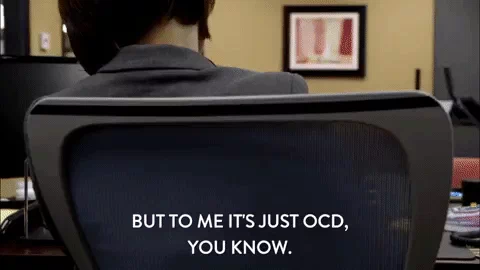
Are you or someone you know living with OCD? Understanding the signs and symptoms can help you get an accuratediagnosisand the treatment necessary to improve your quality of life.
Obsessive-compulsive disorder, or OCD, is a mental health disorder characterized by excessive thoughts (obsessions) which leads a person to do repetitive behaviors (compulsions).
Obsessive Thoughts
People living with OCD experience repeated and persistent unwanted thoughts that cause strong emotional reactions, such as anxiety. Examples of obsessive thoughts include:
Fear of germs or contamination
Fear of harming self or others
Fear of losing something, or someone, important
Wanting things orderly or symmetrical
Doubting that you forgot to do something important, such as locking the door or turning off the oven
Intense worry that something isn't complete

Compulsions
Compulsions are repetitive behaviors that people diagnosed with OCD feel compelled to perform in order to rid themselves of obsessive thoughts.
Sometimes, a person's compulsions are directly related to their obsessive thoughts, such as washing hands as a result of an intense fear of germs. Other times, however, the compulsions are unrelated to these obsessive thoughts.
Examples of compulsions include:
Repeatedly cleaning and organizing
Arranging things in a particular way
Checking things repeatedly, such as if the door is locked
Rituals related to numbers, such as counting or avoiding certain numbers
Avoidance behavior, such as avoiding certain people and places
Repeatedly washing hands

Quiz
Which of the following is an example of a compulsive behavior characteristic of OCD?
The Faces of People Living with OCD
For years, Rebecca has experienced obsessive thoughts about germs. She is so fearful that she may catch a disease, that she has developed compulsions such as:
Washing her hands until they're raw
Showering 2-3 times per day
Avoiding contact with others
Rebecca feels that failure to perform these actions can result in disease or even death.
Lately, Anthony has had racing and obsessive thoughts about losing his loved ones. To calm his thoughts, he has developed rituals with numbers, such as:
Avoiding odd numbers
Counting to the number 8 over and over again
Performing certain actions an even number of times
Anthony feels that if he doesn't engage in these counting rituals, tragedy may strike his loved ones.
Quiz
Why do OCD sufferers engage in compulsive behaviors? Select all that apply.
Take Action

Understanding the signs and symptoms of OCD can help you (or someone you love) begin to manage this disorder.
Your feedback matters to us.
This Byte helped me better understand the topic.


